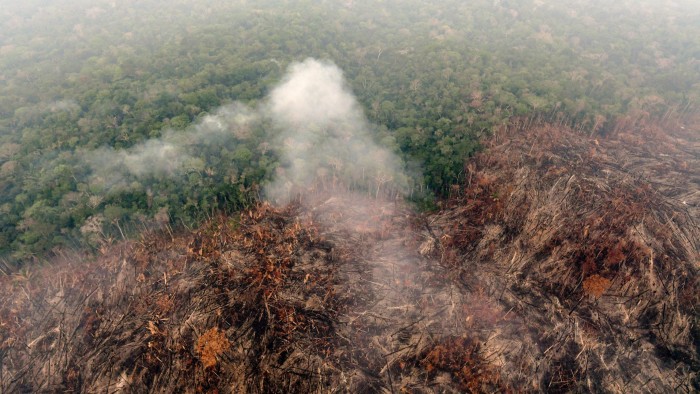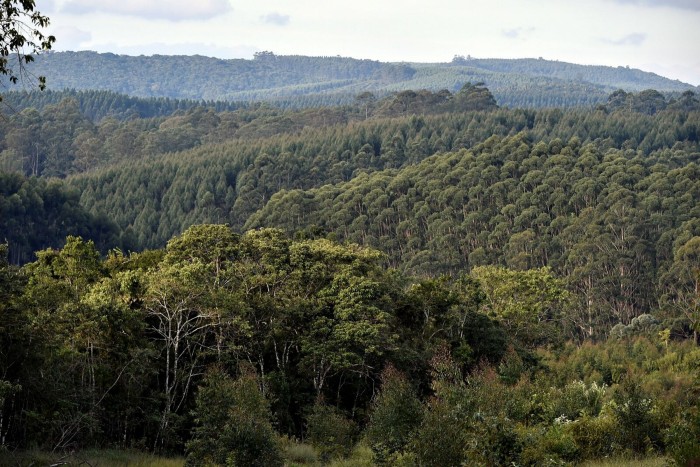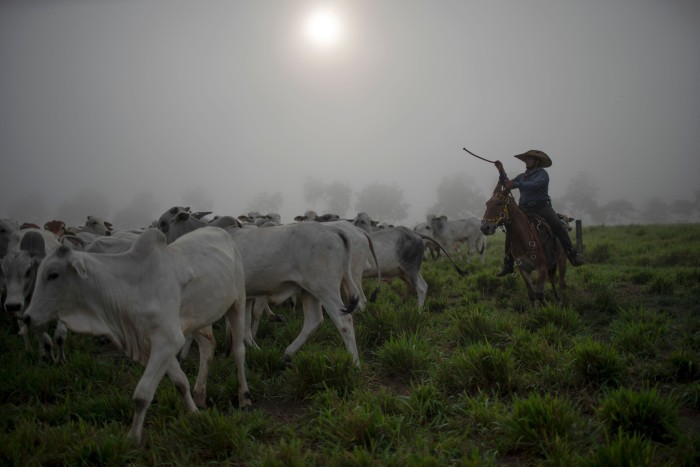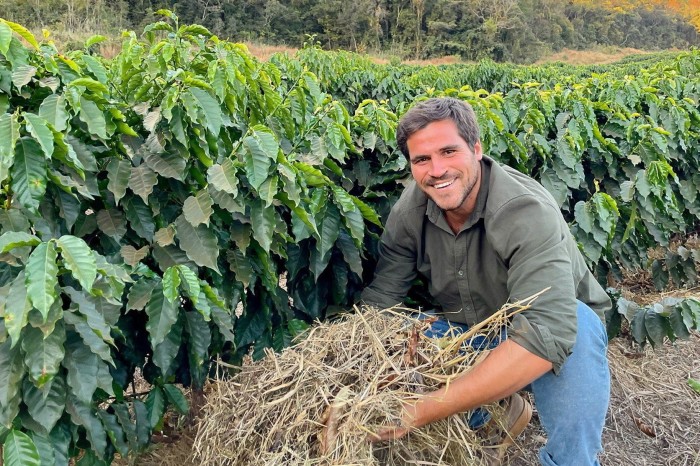Amazon destruction woes overshadow Brazil’s farming advances

Roula Khalaf, Editor of the FT, selects her favourite stories in this weekly newsletter.
Brazilian agriculture is increasingly a tale of two regions: competitive high-tech farming in the developed southern and central parts of the country, and soaring deforestation in the Amazon to clear land for soya and beef farming.
Farming has grown dramatically this century in the South American nation, making it the world’s biggest exporter of soyabeans and beef, on top of traditional commodities such as coffee, cocoa, cotton, citrus and sugar. Agricultural exports from Brazil totalled $125bn last year and the sector now accounts for nearly 30 per cent of GDP.
Since the 1970s, Brazil has funded research into higher yields and better use of technology in agriculture, and backed the sector by promoting farm exports and favourable credit policies. Yet progress in making farming practices more efficient and sustainable risks being undermined by the destruction of the Amazon rainforest.
Luiz Inácio Lula da Silva’s victory in last month’s presidential election has sparked hopes of a major shift in policy. Lula committed during the campaign to a target of zero deforestation in Brazil, though he did not give a date, and has vowed to restore funds for environmental enforcement which were slashed under President Jair Bolsonaro.
Many in the agribusiness sector argue that Brazil’s success in using technology to boost yields proves it has no need to burn down rainforest.
“The gains in productivity have been very substantial,” says Walter Schalka, chief executive of pulp and paper producer Suzano. “We don’t need new areas of land to farm.”
Brazil still only uses 30 per cent of its total land area for agriculture, according to figures from the Brazilian Confederation of Agriculture and Livestock (CNA), compared with the UK’s 71 per cent and 52 per cent in the US. A strict forestry code obliges farmers to set aside at least one-fifth of their land for native vegetation without compensation, and 80 per cent in the Amazon.

Suzano keeps 900,000 hectares of native forest alongside its commercial plantations and has set sustainability targets, including emission reduction and improved water use. “Brazil is always painted as the villain but, in fact, the agricultural sector has made great strides” on sustainability, says Schalka.
But there are also land-grabbers who destroy the rainforest and clear the terrain for farming. Under Bolsonaro, enforcement of Brazil’s strict environmental laws has been drastically scaled back and the Amazon has lost a forested area bigger than Belgium.
Deforestation rates have risen, fallen and risen again this century. Overall, though, the agricultural output of the Amazon has been steadily increasing. The country’s most recent agricultural census, in 2017, found the region was home to 30 per cent of the nation’s cattle and the USDA says 42 per cent of Brazil’s soya production is from the Amazon.
More stories from this report
‘Loss and damage’ debate set to dominate the COP27 agenda
US needs yet more ‘huge lift’ to hit Paris goals
Australia takes steps to catch up on climate action
European crisis risks climate action reputation
India plots tricky path to growth and net zero
Pressure remains on Xi Jinping to kick China’s coal habit
Cairo sets agenda for ‘the African COP’ at Red Sea resort
‘Loss and damage’ stalemate has reached breaking point
Some Amazon farming is legal, but a significant proportion occurs on illegally deforested land. Much rural land is not properly registered, complicating enforcement.
Marina Silva, who pioneered measures to cut deforestation as environment minister from 2003-2008 and is tipped for a major role in Lula’s new government, says a small segment of the agribusiness sector does understand sustainability, but needs to be more vocal. Across the rest of the industry, “there is a part which doesn’t like to get involved in the debate and there’s a reactionary, militant part which tries to dominate,” she explains.
The non-governmental organisation Global Witness says 70 per cent of deforested Amazon areas are now populated by cattle. Two of the country’s three biggest meatpackers, Marfrig and JBS, have committed to using tracing technology to ensure no beef from newly deforested areas enters their supply chains by 2025 (the third, Minerva, has committed to a 2030 date). But campaigners say the controls are not watertight and do not go far enough down the complex supply chains in Brazilian beef farming, where calves can move farm multiple times before reaching the slaughterhouse.

Stung by years of criticism from Europe, many Brazilian farmers instinctively bat away environmental concerns but Felipe Villela, founder of ReNature, a Dutch-Brazilian sustainable agriculture advisory firm, thinks that is misplaced. “A lot of people in Brazilian agribusiness are very defensive,” he says. “Some will protectively claim that Brazilian agribusiness is already sustainable. I don’t like that. We still have a long way to go.”
Villela grew up in a citrus farming family in São Paulo state, in Southeast Brazil, and saw how poor farming practices were degrading the land. A particular bête noire for ReNature is ploughing, which Villela says damages the microbiology of soil and leads to significant carbon emissions. Instead, he says, “seed drills can now plant directly into unploughed soil”.

Brazil’s agriculture ministry is also pushing a low-carbon farming initiative. Launched in 2012, the so-called ABC Plan claims to have reduced emissions by encouraging, for example, the recovery of degraded fields, no-plough farming and planting trees alongside cattle pastures. The programme now aims to mitigate 1.1bn tonnes of carbon emissions by 2030.
Guilherme Lobato, from the southern farming state of Rio Grande do Sul, runs a start-up, ConnectFARM, which uses data analysis to offer farmers planting advice specific to their land and crops, such as which variety of seed to use and how to optimise fertiliser use. “Fertilisers amount to 60 per cent of farmers’ total costs, so accurate measurement is very important,” he says. “We help farmers make better decisions.”
Ultimately, though, no matter how much Brazilian farmers clean up their act, it will count for little if the country’s president cannot get a grip on deforestation. Lula says he will take on this challenge. “Brazil will fight for a living Amazon; a standing tree is worth more than thousands of logs,” he said in his victory speech. “That is why we will . . . promote sustainable development.”
Climate Capital

Where climate change meets business, markets and politics. Explore the FT’s coverage here.
Are you curious about the FT’s environmental sustainability commitments? Find out more about our science-based targets here

Comments